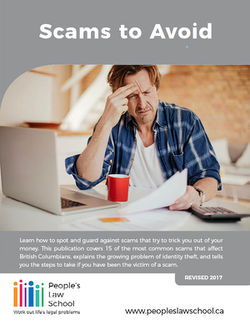Scams to Avoid: Difference between revisions
Drew Jackson (talk | contribs) No edit summary |
Drew Jackson (talk | contribs) No edit summary |
||
| Line 28: | Line 28: | ||
*'''[[If You've Been Scammed]]''' | *'''[[If You've Been Scammed]]''' | ||
**[[If You've Been Scammed#Step 1. Stop communicating with the scammer|Step 1. Stop | **[[If You've Been Scammed#Step 1. Stop communicating with the scammer|Step 1. Stop communication]]{{·}} [[If You've Been Scammed#Step 2. Gather any information you have|Step 2. Gather information]]{{·}} [[If You've Been Scammed#Step 3. If a credit card or bank account is involved, notify your financial institutions|Step 3. Notify financial institutions]]{{·}} [[If You've Been Scammed#Step 4. If any identification is missing, cancel it|Step 4. Cancel missing identification]]{{·}} [[If You've Been Scammed#Step 5. If any mail is missing, contact Canada Post|Step 5. Contact Canada Post]]{{·}} [[If You've Been Scammed#Step 6. Protect your devices|Step 6. Protect your devices]]{{·}} [[If You've Been Scammed#Step 7. Report the incident to the police|Step 7. Notify police]]{{·}} [[If You've Been Scammed#Step 8. Contact the credit reporting agencies|Step 8. Contact credit reporting agencies]]{{·}} [[If You've Been Scammed#Step 9. Report the incident to consumer agencies|Step 9. Notify consumer agencies]]{{·}} [[If You've Been Scammed#Step 10. Consider legal action|Step 10. Consider legal action]]{{·}} [[If You've Been Scammed#Get help|Get help]] | ||
*'''Resources''' | *'''Resources''' | ||
Revision as of 21:58, 25 April 2017

|
|
This is a Clicklaw Wikibook, a collaborative, plain language legal publication that is updated as a wiki and can be printed or downloaded. |
|
|
Download the full Wikibook in PDF. |
|
|
Customize: take what you need, leave the rest (learn more). |
Scams to Avoid from People's Law School helps you learn how to spot and guard against scams that try to trick you out of your money. It covers 15 of the most common scams that affect British Columbians, explains the growing problem of identity theft, and tells you the steps to take if you have been the victim of a scam.
Contents
- If You've Been Scammed
- Step 1. Stop communication · Step 2. Gather information · Step 3. Notify financial institutions · Step 4. Cancel missing identification · Step 5. Contact Canada Post · Step 6. Protect your devices · Step 7. Notify police · Step 8. Contact credit reporting agencies · Step 9. Notify consumer agencies · Step 10. Consider legal action · Get help
- Resources
Copyright & Disclaimer
![]() Scams to Avoid © People’s Law School is, except for the images, licensed under a Creative Commons Attribution-NonCommercial-ShareAlike 2.5 Canada Licence.
Scams to Avoid © People’s Law School is, except for the images, licensed under a Creative Commons Attribution-NonCommercial-ShareAlike 2.5 Canada Licence.
At People's Law School, we believe accurate, plain English information can help people take action to work out their legal problems. This resource explains in a general way the law that applies in British Columbia. It is not intended as legal advice. For help with a specific legal problem, contact a legal professional. Some sources of legal help are highlighted in the "Where to Get Help" section.
About People's Law School

People's Law School is a non-profit society in British Columbia providing free education and information on the legal problems of daily life.